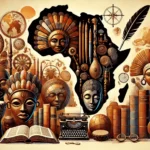The Power of Our Story: How African Writers Are Changing the Narrative
Africa is not a country. It’s not a war zone. It’s not a single story. Yet, for decades, the cultural misrepresentation of Africa in global media and literature has reduced this vibrant, diverse continent to a few harmful clichés. From hunger and poverty to tribal wars and underdevelopment, the images repeated around the world do not reflect the complexity or humanity of real African life.
As a Gambian writer and storyteller, I’ve made it my mission to help change that narrative.
Colonialism and the Origins of the Stereotype
Colonial literature and propaganda significantly distorted the world’s perception of Africa. In Black Skin, White Masks, Frantz Fanon speaks powerfully about how colonialism created a fractured identity—one in which Africans often see themselves through the eyes of others. This misrepresentation is more than just wrong—it’s damaging. It erodes confidence, flattens history, and silences truth.
How African Writers Are Reclaiming the Narrative
From Chinua Achebe to Ngũgĩ wa Thiong’o, African literature has always resisted false portrayals. Achebe once said, “Until the lions have their historians, the history of the hunt will always glorify the hunter.” That’s what our writers have become—our historians, our mirrors, our griots. Books by African authors—past and present—show the world who we truly are: people of culture, intellect, strength, and soul.
In The Little Book of Afrocanos, I explore Africa’s journey to freedom and challenge the mental colonisation that still affects our people today. This book is part of my ongoing effort to elevate authentic African voices.
Explore more:
The Digital Griot: Storytelling in the 21st Century
Today’s griot uses a keyboard. African creators now harness blogs, podcasts, social media, and film to share their stories without relying on Western gatekeepers. This is a decisive shift—one that reclaims both control and authenticity. On TikTok, in YouTube documentaries, and on African blogs, you’ll find our people telling the stories we want to know in the voices we want to use.
Frequently Asked Questions (FAQs)
- Why is Africa misrepresented in global media? Africa is often portrayed through a colonial or poverty-focused lens, ignoring its richness and diversity.
- How can storytelling change Africa’s narrative? Storytelling empowers Africans to take control of their narrative, challenge stereotypes, and share authentic experiences.
- Who are the key African writers changing the narrative? Chinua Achebe, Ngũgĩ wa Thiong’o, Chimamanda Ngozi Adichie, and many modern authors across the continent.




Pingback: Digital Africa: Language and Culture Preservation — Lamin Ceesay